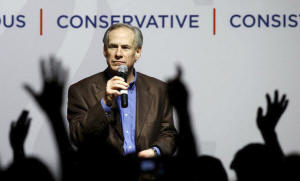|
Texas governor signs relaxed version of
voter ID legislation
 Send a link to a friend
Send a link to a friend
 [June 03, 2017]
(Reuters) - Texas Governor Greg
Abbott has signed into law a more relaxed version of state
voter-identification requirements than a previously enacted measure
struck down by U.S. courts as racially discriminatory. [June 03, 2017]
(Reuters) - Texas Governor Greg
Abbott has signed into law a more relaxed version of state
voter-identification requirements than a previously enacted measure
struck down by U.S. courts as racially discriminatory.
The new measure was designed to remedy flaws the courts found in the
original law by providing Texans an alternative to the type of
government-issued photo ID they had been required to present in order to
vote at polling stations.
Voters will now be permitted to cast their ballots by furnishing some
other documentation bearing their name and address, such as a bank
statement or utility bill, if they also sign an affidavit attesting to
having a "reasonable impediment" to obtaining a valid photo ID.
Critics contend that the measure, passed by the Republican-controlled
legislature last month and signed on Thursday by Abbott, a first-term
Republican, is still aimed at discouraging racial and ethnic minorities,
who tend to favor Democrats. They particularly object to provisions
carrying a prison sentence of up to 10 years for lying on a voter-ID
affidavit.

The list of valid photo-IDs accepted under both the previous law and the
revised measure includes a driver's license, U.S. military
identification, U.S. passport and concealed handgun permit, but not a
student ID card.
Texas ranks as the most populous Republican-dominated state, with the
Republican Party winning every statewide race for elective office for
more than 20 years. But shifting demographics have given hope to
Democrats that they can eventually turn the state to their column.
[to top of second column] |

Texas Governor Greg Abbott speaks at a campaign rally for U.S.
Republican presidential candidate Ted Cruz in Dallas, Texas February
29, 2016. REUTERS/Mike Stone/File Photo

The original voter ID requirements were signed into law in 2011 by
then-Texas Governor Rick Perry, a Republican. Considered one of the
nation's strictest such measures, it has been subject to years of
court challenges, with the law's opponents saying it could exclude
up to 600,000 voters.
Supporters of such laws have countered they are necessary to protect
the integrity of the election system, despite little evidence of
actual voter fraud.
The U.S. Supreme Court declined in January to hear an appeal by
Texas seeking to revive the original law's requirements.
(Reporting by Steve Gorman in Los Angeles; Editing by Lisa Shumaker)
[© 2017 Thomson Reuters. All rights
reserved.]
Copyright 2017 Reuters. All rights reserved. This material may not be published,
broadcast, rewritten or redistributed.
 |